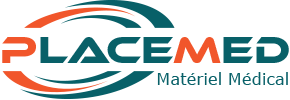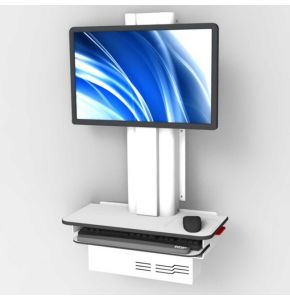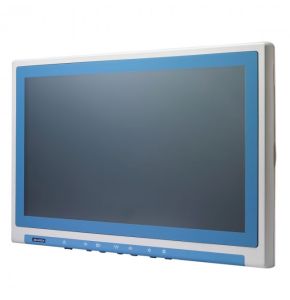Medical panel PC
All-in-one full web solution for healthcare professionals
Price on request18/11/2024 318
The CWM wall column
Price on request18/11/2024 301
Medical PC panel POC W213 IP54 model 21 ''
Price on request18/11/2024 357
Medical Panel PC: The Technological Ally of Modern Healthcare
Medical panel PCs are all-in-one computers specially designed for clinical environments. They offer durability, hygiene, and performance to support healthcare professionals in their daily work. Thanks to these devices, patient care is optimized, and administrative tasks are simplified. Let's discover together the advantages of medical panel PCs, how they improve workflow, the features to consider when purchasing, maintenance tips, and their applications in various hospital departments.
What Are the Advantages of Medical Panel PCs Compared to Traditional Computers?
Medical panel PCs offer several advantages that set them apart from traditional computers. Here are the main benefits that make them an ideal choice for healthcare environments.
- Fanless Design: These computers are designed without fans to prevent the circulation of germs and dust. This reduces the risk of contamination and ensures a healthier environment for patients and staff.
- Easy-to-Clean Surfaces: Medical panel PCs have smooth and waterproof surfaces. They are resistant to disinfectants, allowing effective and regular cleaning without damaging the device.
- Medical Certifications: They comply with current medical standards, such as IEC 60601-1. These certifications ensure electrical safety suitable for sensitive clinical environments.
- Durability: Designed for intensive use, they are robust and reliable. Their longer lifespan compared to traditional computers represents a cost-effective investment for healthcare facilities.
- Optimized Performance: Medical panel PCs offer high performance to handle demanding medical applications. They allow quick access to data and smooth execution of specialized software.
By choosing a medical panel PC, healthcare professionals benefit from a tool tailored to their needs, thereby enhancing the quality of care provided.
How Do Medical Panel PCs Contribute to Improving Clinical Workflows?
Medical panel PCs play a key role in optimizing clinical processes. Here's how they enhance workflow in healthcare facilities.
- Mobility: Thanks to their compact and lightweight design, they can be easily moved between rooms or mounted on medical carts. This allows staff to access information wherever they are.
- Integration with Medical Devices: They can connect to other medical equipment, such as vital sign monitors. This facilitates the collection and sharing of real-time data.
- Immediate Access to Patient Records: Professionals can quickly view and update electronic records. This improves decision-making and reduces the risk of errors.
- Effective Communication: They enable better communication among healthcare team members. Information is shared instantly, enhancing care coordination.
- Time Saving: By automating certain administrative tasks, they free up time to focus on patients. Workflows are simplified and more efficient.
The use of medical panel PCs thus contributes to better organization of care and an overall improvement in the quality of services offered to patients.
What Technical Features Should You Look for When Purchasing a Medical Panel PC?
To choose the most suitable medical panel PC for your needs, it is important to consider certain technical characteristics. Here are the key elements to take into account.
- Performance: Opt for a powerful processor and sufficient RAM to run medical applications without lag. This ensures smooth and efficient use.
- Connectivity: Check for the presence of USB, HDMI, Ethernet, and other necessary ports. Good connectivity allows easy connection of the panel PC to other devices or the facility's network.
- Display Options: Choose an appropriate screen size with sufficient resolution for comfortable reading. Touchscreens can also facilitate interaction with the system.
- Robustness: Ensure the device is resistant to shocks, vibrations, and splashes. This guarantees increased durability, even in demanding environments.
- Medical Certifications: Verify that the panel PC meets medical standards, such as IEC 60601-1. This ensures compliance with safety requirements for medical devices.
By considering these features, you can choose a high-performance and reliable medical panel PC, suitable for your work environment.
How to Ensure Maintenance and Security of Medical Panel PCs?
Regular maintenance and security of medical panel PCs are essential to ensure their proper functioning and the protection of sensitive data. Here are some tips to achieve this.
Regular Updates
Install operating system and software updates as soon as they are available. This fixes security vulnerabilities and improves device performance.
Disinfection Protocols
Regularly clean the surfaces of the panel PC with appropriate products. Follow the manufacturer's recommendations to avoid damaging the device while ensuring optimal hygiene.
Protection Against Cyberattacks
Use antivirus software and a firewall to protect the system against online threats. Educate staff on good IT security practices, such as not opening suspicious emails or installing unauthorized software.
Regular Backups
Perform regular data backups to prevent data loss in case of a failure. Store them securely, in accordance with data protection regulations.
Technical Inspections
Schedule periodic technical checks to verify the condition of components. Replace worn or defective parts to maintain device performance.
By following these recommendations, you ensure the longevity of your medical panel PCs and the security of the information processed.
What Are Common Applications of Medical Panel PCs in Various Hospital Departments?
Medical panel PCs are used in many hospital departments. Here are some common application examples.
- Operating Room: They are used to display medical images during surgical procedures. Their hygienic, fanless design is ideal for sterile environments.
- Emergency Department: Doctors can quickly access patient records and care protocols. This speeds up patient handling and improves responsiveness in critical situations.
- Intensive Care Units: They allow real-time monitoring of patients' vital signs. Data is centralized, facilitating tracking and coordination of care.
- Telemedicine: Medical panel PCs are used for remote consultations. They offer optimal image and sound quality for effective communication between doctors and patients.
- Laboratories: They assist technicians in analyzing and processing samples. Their robustness and reliability are essential in these demanding environments.
These examples demonstrate the versatility of medical panel PCs and their importance in the daily operations of hospitals.
In conclusion, medical panel PCs are indispensable tools for modern healthcare facilities. They offer significant advantages over traditional computers, particularly in terms of hygiene, durability, and performance. By enhancing clinical workflows, they contribute to better quality care and increased efficiency of medical staff.
When purchasing a medical panel PC, it is important to consider technical features that suit your specific needs. Ensuring regular maintenance and adhering to security protocols guarantees the device's longevity and the protection of sensitive data.
Medical panel PCs find their place in various hospital departments, showcasing their versatility and utility. Whether in the operating room, emergency department, or telemedicine, they facilitate the work of healthcare professionals and enhance the patient experience.
At Placemed, we offer a wide range of high-quality medical panel PCs. Our products meet medical standards and are designed to meet the needs of the most demanding healthcare facilities. Feel free to browse our selection and contact us for personalized advice. Together, let's equip your services with the best technological solutions to provide excellent care.
 Francais
Francais 


